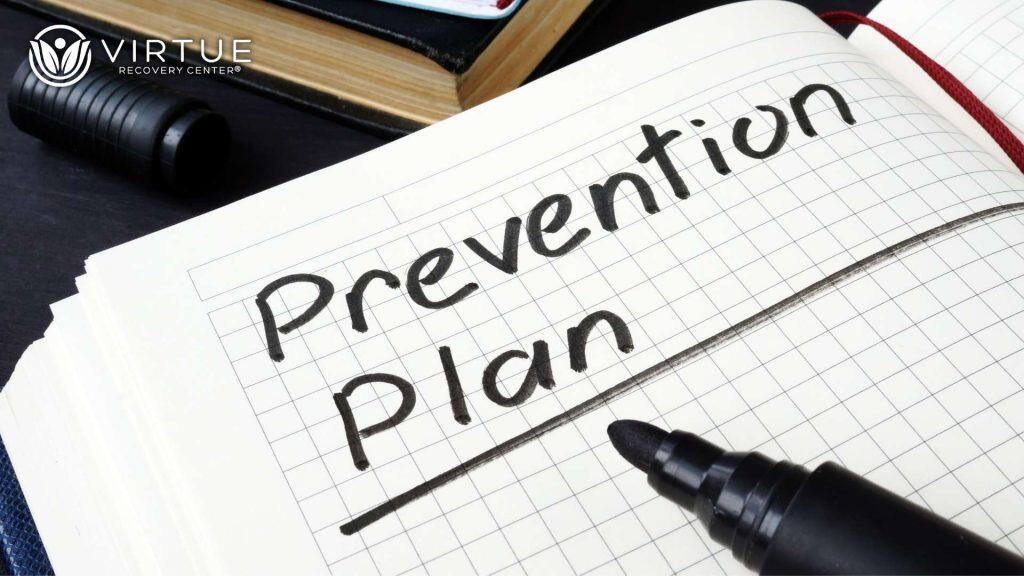Key Takeaways
-
A relapse prevention plan helps people stay on track after addiction treatment.
-
The plan includes triggers, warning signs, and healthy coping skills.
-
Support systems like friends, family, and support groups are key to success.
-
Relapse is common but can be managed with a solid plan in place.
-
Help is available—no one has to face relapse alone.
Introduction
Relapse happens. It’s not a failure—it’s part of the journey for many people in recovery.
After leaving a treatment program, the world can feel overwhelming. Stress, emotions, or even good memories can bring back cravings. That’s why having a relapse prevention plan is so important.
This plan acts like a safety net. It reminds you what to do when things get tough. It keeps your recovery goals front and center. And most of all, it helps you feel prepared—not lost.
In this article, you’ll learn what relapse is, how to build a prevention plan, and how to stay strong during recovery.
What Is a Relapse?
A relapse happens when someone who has stopped using drugs or alcohol starts again. But relapse doesn’t always happen all at once.
There are three stages of relapse:
-
Emotional relapse – you’re not using, but you feel anxious, angry, or withdrawn.
-
Mental relapse – you start thinking about using again, remembering the “good times.”
-
Physical relapse – you drink or use drugs.
Relapse can be quick or slow. That’s why it’s important to spot the signs early—and act fast.
Why Is a Relapse Prevention Plan Important?
Recovery is a process. There will be good days and hard days.
A relapse prevention plan helps you prepare for both. It’s your guide for how to stay sober, even when life feels hard.
Without a plan, you might feel lost when triggers show up. But with a plan, you’ll know what to do. It’s like having a map when you’re trying to get home.
Your plan gives you tools to prevent relapse, handle cravings, and protect your progress.
What Should Be in a Relapse Prevention Plan?
Your plan should be simple, clear, and personal. No two plans are exactly alike, but they often include:
1. Triggers for Relapse
These are people, places, or feelings that make you want to use.
Examples:
-
Stress at work
-
Seeing old friends who still use
-
Parties with alcohol
-
Loneliness
Knowing your triggers helps you stay away—or make a plan to face them safely.
2. Warning Signs
Relapse doesn’t come out of nowhere. Look for these early clues:
-
Feeling hopeless or angry all the time
-
Skipping support group meetings
-
Isolating from loved ones
-
Thinking “just one time won’t hurt”
Spotting these signs early gives you time to act before it’s too late.
3. Coping Skills and Strategies
These are tools you use when a craving hits. Some ideas:
-
Call a friend or sponsor
-
Go for a walk
-
Write in a journal
-
Practice deep breathing
-
Use positive self-talk
-
Attend a support group
Your plan should list things that help you calm down, think clearly, and stay sober.
4. Support Network
List names and numbers of people you can trust:
-
Family members
-
Sober friends
-
Sponsor
-
Therapist or counselor
-
People from your treatment center or group
These are the people who lift you up—not bring you down.
5. Daily Routine and Healthy Habits
Structure helps. A good routine gives you balance and purpose.
-
Eat healthy meals
-
Sleep on time
-
Exercise
-
Plan your day
-
Spend time doing things you enjoy
Keeping busy in healthy ways makes it easier to stay away from substances.
6. Emergency Plan
What if you feel close to using again? Your plan should include:
-
Who to call right away
-
A place you can go to feel safe
-
A reminder of your reasons for staying sober
An emergency plan gives you direction when your thoughts feel scattered.
Common Triggers and How to Manage Them
Triggers are part of life. Learning to face them is part of the recovery journey.
Here are a few common ones—and ways to deal with them:
-
Stress: Practice breathing exercises or talk to someone.
-
Loneliness: Go to a support group or call a friend.
-
Anger or sadness: Try journaling or therapy.
-
Seeing old friends who use: Politely say no or plan new friendships.
-
Parties or bars: Avoid or bring someone who supports your sobriety.
You can’t always control triggers—but you can control how you respond.
Developing Coping Skills
Coping skills are like tools in your mental toolbox. They help you handle stress and avoid relapse.
Try adding some of these to your plan:
-
Deep breathing or mindfulness
-
Going for a walk or run
-
Listening to music
-
Drawing, painting, or writing
-
Talking to someone you trust
-
Saying “no” with confidence
-
Taking one day—or one hour—at a time
Practice these often, not just during tough moments. They get stronger the more you use them.
Building a Support System
Recovery from addiction is hard to do alone. That’s why a support network matters so much.
A strong support system:
-
Reminds you that you’re not alone
-
Encourages you when things get tough
-
Holds you accountable
-
Celebrates your victories
Your support group could include:
-
A sponsor
-
Friends in recovery
-
Family members who care
-
A therapist or recovery coach
-
Support group meetings (in-person or online)
If you haven’t built your support system yet, now is the time.
Making It a Living Document
Your relapse prevention plan isn’t a one-time thing. Life changes. You change.
Update your plan as you grow in recovery. Add new triggers, new coping skills, or new names to your support list.
Talk about it with your therapist or sponsor. Keep it somewhere easy to find. Make copies if needed.
A plan that grows with you will always be more effective.
How Virtue Recovery Houston Helps with Relapse Prevention
At Virtue Recovery Houston, we know how important it is to feel supported—not just during treatment, but after it too.
Our programs include:
-
Personalized relapse prevention strategies
-
One-on-one therapy and group support
-
Help managing mental health conditions
-
Tools to build a life you’re proud of
-
Aftercare plans that guide you for the long haul
We believe in long-term healing—not quick fixes. Our team walks with you every step of the way.
Conclusion
Relapse doesn’t mean the end. It’s a warning light. A chance to learn. A signal that you need support, not shame.
Having a relapse prevention plan helps you move forward with confidence. It gives you the power to stay in control, no matter what life throws your way.
If you’re ready to start your addiction recovery journey, call Virtue Recovery Houston today at 713-234-6254. You don’t have to do this alone.
FAQs About Creating a Relapse Prevention Plan for After Substance Abuse Treatment
What is a successful relapse prevention plan?
A successful relapse prevention plan is a structured strategy designed to help someone in recovery maintain sobriety by identifying triggers, developing coping strategies, and recognizing the signs of relapse before they lead to a return to substance use.How can I create a relapse prevention plan template?
You can create a relapse prevention plan template by outlining specific triggers that may lead to a relapse, detailing coping strategies that have worked in the past, and including a list of support resources such as therapy, support groups, and hotlines for relapse prevention help.What are some effective relapse prevention strategies?
Effective relapse prevention strategies include avoiding high-risk situations, practicing stress management techniques, utilizing a support network, staying engaged in health treatment, and regularly reviewing and adjusting the prevention plan in place as needed.How does understanding relapse contribute to long-term recovery?
Understanding relapse is crucial because it helps individuals recognize the risk factors and triggers that could lead to a return to substance use. This awareness allows for better preparation and management of these risks, ultimately supporting a person’s recovery journey.What is the risk of relapse for someone struggling with addiction?
The risk of relapse can be high for someone struggling with addiction, especially in the early stages of recovery. Factors such as stress, social pressures, and lack of support can increase the likelihood of a return to substance use, making a detailed prevention plan essential.What are the signs of relapse that I should look out for?
Signs of relapse may include a change in mood, withdrawal from support networks, increased cravings, or a decrease in commitment to the recovery process. Recognizing these signs early can help prevent a return to substance use.Where can I find help with addiction and creating a prevention plan?
Help with addiction can be found through various resources including local treatment centers, support groups like Alcoholics Anonymous, and online platforms that provide guidance on creating a successful relapse prevention plan.How does substance use and mental health impact the risk for relapse?
Substance use and mental health are closely linked, and mental health disorders can significantly impact a person’s recovery. Individuals with co-occurring disorders may face a higher risk for relapse, making it essential to address both issues in the prevention plan.Why is it important to have a proactive action plan in place?
Having a proactive action plan in place is important because it equips individuals with the tools and strategies needed to combat cravings and triggers, ultimately reducing the likelihood of addiction relapse and supporting sustained recovery.How Can Understanding Addiction Therapy Help in Creating a Successful Relapse Prevention Plan?
Understanding addiction therapy is crucial in crafting an effective relapse prevention plan. By evaluating your need for addiction therapy options, you can identify the specific strategies that resonate with your recovery goals. This thorough assessment empowers you to address triggers and develop healthier coping mechanisms, ultimately enhancing your long-term success.








